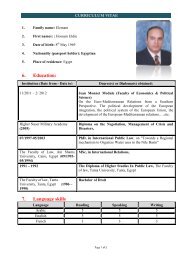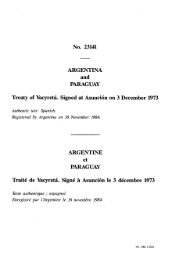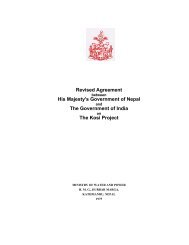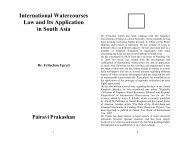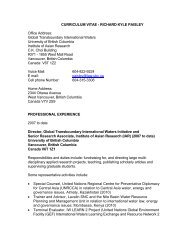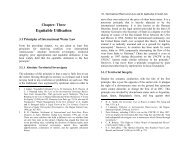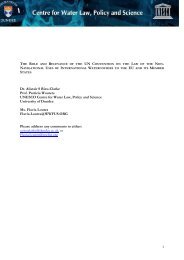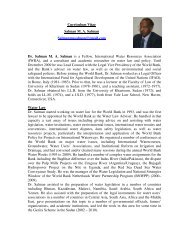Upreti, Trilochan, International Watercourses Law and Its Application ...
Upreti, Trilochan, International Watercourses Law and Its Application ...
Upreti, Trilochan, International Watercourses Law and Its Application ...
Create successful ePaper yourself
Turn your PDF publications into a flip-book with our unique Google optimized e-Paper software.
246 / <strong>International</strong> <strong>Watercourses</strong> <strong>Law</strong> <strong>and</strong> <strong>Its</strong> <strong>Application</strong> in South Asia Prospects <strong>and</strong> Problems of Nepalese Water Resources / 247appreciable harm; without this assurance being given, fundingcannot be made available. 194Under such an arrangement, the poorer state cannot developany water projects in her watercourses whilst a wealthy statecan develop any project of her own. The reason for thissituation is that the wealthy country can undertake a waterproject in an IWC, ignoring other riparian interests <strong>and</strong> onlytaking into consideration her own maximum benefit; this in fact194 The World Bank Operational Manual: Operational Policies; Project on<strong>International</strong> Waterways. The WB annex 2.A.OP. 7.50 October 1994,pp. 193-200. (OP 7.50 <strong>and</strong> BP 7.50 have been amended in 2001. Alsosee www4.worldbank.org/legal/legen/legen_iw.html).“Agreements/ Arrangements3. Projects on international waterways may affect relations betweenthe Bank <strong>and</strong> its borrowers <strong>and</strong> between states (whether membersof the Bank or not). The Bank recognizes as that the co-operation<strong>and</strong> goodwill of riparians is essential for the efficient utilisation<strong>and</strong> protection of the waterway. ...In cases where differencesremain unresolved between the state proposing the project(beneficiary state) <strong>and</strong> other riparians, prior to financing theproject the Bank normally urges the beneficiary state to offer tonegotiate in good faith with the other riparians to reachappropriate agreement or arrangements.”4. “NotificationThe bank ensures that the international aspects of project on aninternational waterways are dealt with at the earliest possibleopportunity. If such a project is proposed, the Bank requires thebeneficiary state, if it has not already done so, formally to notifythe other riparians of the proposed project <strong>and</strong> its project details(see B.P 7.50, para. 3). If the prospective borrower indicates tothe bank that it does not wish to give notification, normally theBank itself does so. If the borrower also objects to the Bank’sdoing so, the Bank discontinues processing of the project. Theexecutive directors concerned are informed of thesedevelopments <strong>and</strong> any further steps taken.”6. “Following notification, if the other riparians raise objections tothe proposed project, the Bank in appropriate case may appointone or more independent experts to examine the issue inaccordance with B P 7.50, paras. 8-12. Should the Bank decide toproceed with the project despite the objections of the otherriparians, the Bank informs them of its decision.” p. 194.frequently happens. 195 The argument is that although IWL isuniversal, its application varies. That is to say, if you are acountry with resources, you can develop a project as you wish,even to the detriment of others <strong>and</strong> no one can stop you; but ifyou have no resources you have to borrow the money, <strong>and</strong> onlyif the riparian states concerned are in favour can the project bedeveloped. The wealthy nations have not adhered to the law,whereas the developing nations can do nothing except agreewith all the preconditions of the donor, which constitutes aninequitable arrangement in this area. If equality, fairness <strong>and</strong>justice are to prevail, then this impractical <strong>and</strong> unfair systemshould be reassessed, <strong>and</strong> a fair <strong>and</strong> equitable arrangementshould be arrived at.In other words the WB, by giving precedence to the ‘no harm’principle over more fundamental <strong>and</strong> overarching principles –particularly that of reasonable <strong>and</strong> equitable utilisation – isignoring the main thrust of IWL. 196 In fact, from Article 7, it is195 In the Nile basin, downstream Egypt had utilised all the benefits, <strong>and</strong>vetoed the other upstream nations, particularly Ethiopia, from utilisingthe Blue Nile’s water. Whereas in the Euphrates <strong>and</strong> Tigris Basin,Upstream Turkey is in an advantageous position, ignoring Iraq’slegitimate <strong>and</strong> historic right over it. She has utilised <strong>and</strong> diverted waterfor her own interests in 1991 during the Gulf War, <strong>and</strong> diversion of allwaters of the Euphrates to fill the Ataturk reservoir was proposed. T.Hoffer, "<strong>International</strong> Inl<strong>and</strong> Waters" (1994), in 4 Waters Nepal, p.304, states that India diverted the Ganges waters at the Farakka withoutformally informing Pakistan (later Bangladesh); on the contrary, theobjections raised in this connection were not heard by the former, <strong>and</strong>even when the case was brought to the UNGA in 1976 by the latter, notangible result for reparation to the former was undertaken.In 1948 India temporarily interrupted the Indus river waters toPakistan, advocating Harmon's doctrine; as for the USA, she divertedthe Chicago river’s waters ignoring Canadian interests.196 Commentary, II (part two)YBILC (1994), p. 103: “in certaincircumstances “equitable <strong>and</strong> reasonable utilization” of an internationalwatercourse may still involve significant harm to another watercourseState. Generally, in such instances, the principle of equitable <strong>and</strong>reasonable utilisation remains the guiding criterion in balancing theinterests at stake.”



